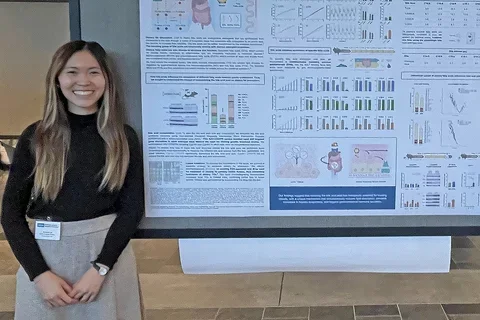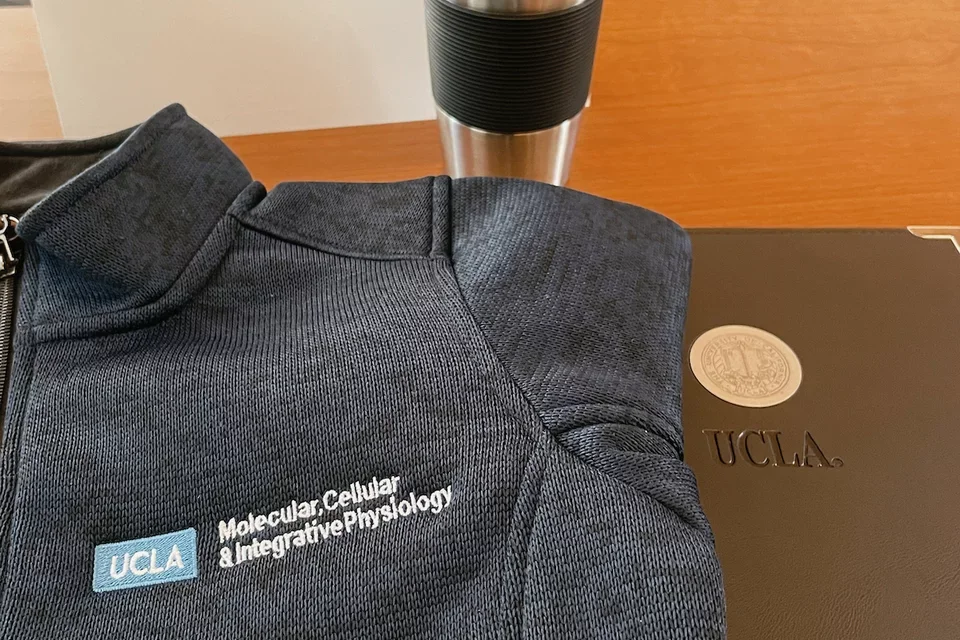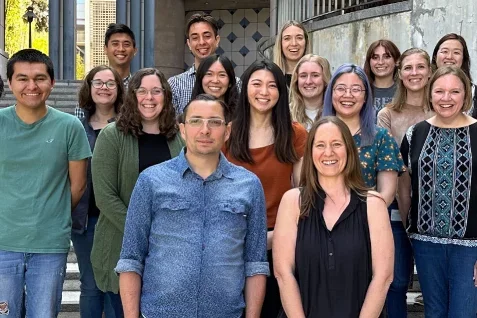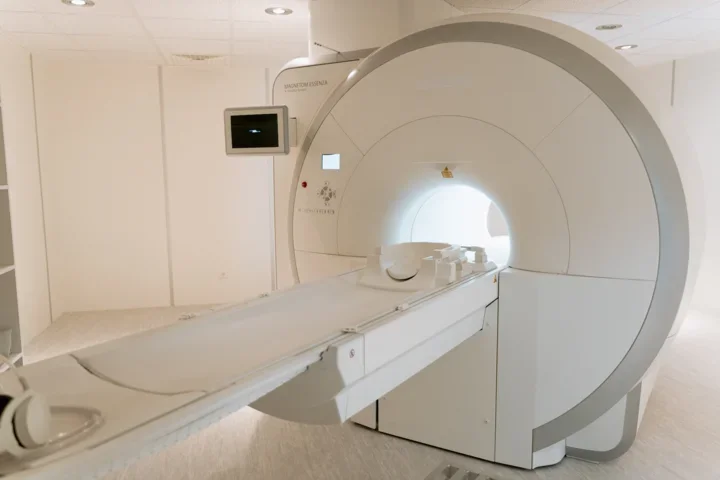Clinical Dietitian Pursues Basic Science Research to Help Patients
Student Spotlight

Meet Rochelle Wing-Hin Lai
- UCLA PhD program: Molecular, Cellular, and Integrative Physiology (MCIP)
- Overarching research question: Can we prevent and treat liver disease on a deep, cellular level?
- Fun fact: Rochelle is ambidextrous—something that has proven useful in the lab. For example, she’s able to use a pipette with either hand.
Rochelle Lai is pursuing her Doctor of Philosophy (PhD) in the Molecular, Cellular, and Integrative Physiology (MCIP) program at UCLA. Her current research focuses largely on the liver—the cornerstone of metabolism.
“It's such an important organ,” she says. “Any kind of disease that can harm the liver can affect all other systems as well.”
Her research interests stem from her first career as a pediatric clinical dietitian at Stanford Medicine Children’s Health. While she found supporting patients through nutrition fulfilling, she often thought of ways she might help even more.
“I felt recommending formulas and administering parenteral nutritional interventions could only go so far in treating a disease,” she explains. “It felt like I was bandaging problems instead of looking for true solutions in the diseases’ deeper cellular underpinnings.”
This feeling drew Rochelle toward the idea of returning to school.
After all, if she had her PhD, she could play a major role in developing the products and treatments dietitians prescribe. Gaining a stronger command of the basic science underlying metabolic conditions would also enable her to advance how they’re managed in the clinic.
In short, a PhD could empower her to approach metabolic questions from the perspective of both a clinician and a scientist.
“Currently, many products clinical dietitians prescribe aren’t developed by the dietitians themselves,” she explains. “And I think channeling perspectives from both the lab and the clinic will be powerful and important in treating nutrition-related diseases in the future.”
Rochelle found the idea of returning to school invigorating—for the most part. However, pivoting away from a budding career as a clinical dietitian to become a full-time student felt daunting in terms of stability and security.
Persevering through the change, discomfort, and uncertainty felt to Rochelle like a way to honor her parents.
“My parents left Hong Kong to come to the United States,” she says. “I feel very lucky that their sacrifice helped me get to where I am today.”
Through their support and forward-thinking choices, Rochelle’s parents ensured she had the opportunity to pursue her dreams, further her own education, and advance her scientific field.
She could pay their support forward to countless patients whose lives might one day be changed by her research.

Choosing the Right PhD Program
Rochelle’s major decision to pursue a PhD branched out into many related and equally serious decisions, namely choosing a program aligned with her goals, values, and lifestyle preferences.
She knew both the institution and the specific program she chose would heavily influence the trajectory of the second career just starting to take shape in her mind.
UCLA and its Molecular, Cellular, and Integrative Physiology (MCIP) program quickly rose to the top of Rochelle’s consideration list. Their culture of prioritizing research over classes, fostering mentorship, financially supporting PhD students, and promoting a healthy work-life balance matched her primary needs and wants.
Rochelle felt especially encouraged when she came on-site for interviews. Many current PhD students affirmed the promise of work-life balance.

“Having separation between work and life was very important to me, especially coming from a clinical job,” she explains. “It was a relief—knowing that I’d be able to simply come in and work in the lab and then go home and spend time with my family.”
After spending a few years at UCLA, she can say she’s received all the support she expected and then some. While she expected to benefit from support and mentorship, she didn’t fully anticipate the depth, breadth, and quality of connections she’d form within MCIP and across the institution.
“As PhD students at UCLA, we have access to an incredible range of experts in different areas who can be our faculty mentors and serve on our dissertation committees.”
Rochelle feels lucky to have been surprised in a good way. Nevertheless, her favorite advice to share with current and future PhD applicants is still to minimize surprises whenever possible—by asking a lot of questions.
“Do not be afraid to ask questions, including questions that may seem personal.”
Applicants should never shy away from asking precise questions about what they want and need to know about the program. Rochelle wanted to understand as many specifics about work-life balance as possible.
“When I interviewed, I asked the current students about their paid time off and whether or not they feel supported in times of crisis.”
Only by unapologetically asking questions did Rochelle get the information she needed to feel confident in making a life-altering decision about where to earn her PhD.

Metabolic Research Rooted in Humanism
Rochelle loves how much time she gets to spend in the lab. Broadly speaking, she’s studying how human bodies absorb and allocate dietary fat as well as how an imbalance in these systems can lead to disease.
She hopes gaining a detailed understanding of precisely how bodies process dietary fat will lead to insights relevant to the treatment and prevention of metabolic dysfunction-associated liver disease, formerly known as fatty liver disease.
While Rochelle fully supports behavior-focused interventions, she acknowledges the natural challenges and limitations that come with strategies dependent on human behavior.
“Humans aren't perfect, right? They can only go so far in changing their dietary and lifestyle habits,” she explains. “So I want to know: Can we prevent and treat liver disease on a deep, cellular level?”
In addition to being minimally dependent on patient compliance for efficacy, interventions that target conditions on a cellular level could help patients continue enjoying the foods they love in moderation.
“One of my mottos is that all foods fit—that food is meant to be enjoyed,” she says. “As a dietitian, I understand that food is never meant to be demonized. I love Coca-Cola, and I'm never against drinking it because doing so makes me happy.”

Congenital pediatric liver conditions are another primary motivator behind Rochelle’s desire to develop interventions that target metabolic conditions at a molecular level. She was part of the pediatric liver transplant team while at Stanford Medicine Children's Health. These inherited conditions aren’t caused by behaviors and cannot be corrected through behavior change.
Currently, many kids suffering from these conditions have no options beyond liver transplant. Rochelle hopes to change that with her research.
Apart from the intellectual stimulation that comes from conducting research, Rochelle finds the people she gets to meet daily in her lab among the most rewarding aspects of her current research.
“I like to say that I'm here for the science, but in many ways I’m here for the people.”
Her mentors and colleagues have inspired her to think more critically and to be a better scientist. On the patient-facing side, nothing gets her as excited as uncovering an insight in her lab that has potential to translate to the clinic.
All her efforts have a solid foundation in humanism—in her goal to help as many different people experiencing as many different problems and conditions as possible.
“Finding a way to alleviate or treat the most common liver diseases on a deep mechanistic level helps the entire population experiencing these conditions—from kids to adults.”



